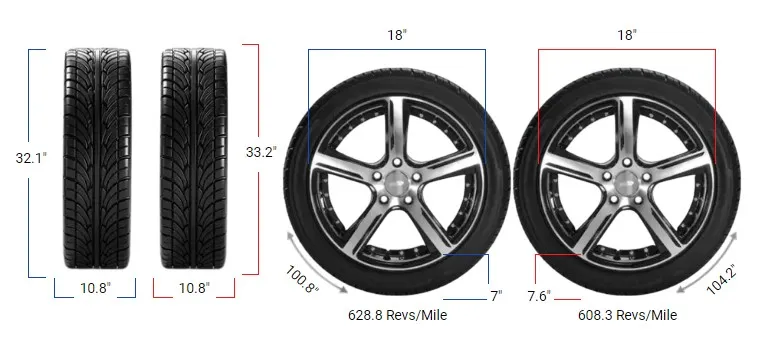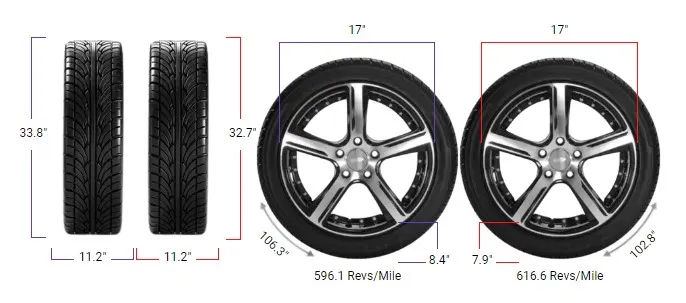Tire Size 195/55r16 vs 205/55r16

Changing your tire size can affect many aspects of your driving experience. Before swapping your 195/55R16 tires for 205/55R16 ones, it’s crucial to weigh the pros and cons. Let’s dive in and discover if this upgrade is right for you.
- Wider tires provide better traction and handling on various surfaces
- Braking distances can be reduced with the larger contact patch
- Fuel efficiency may slightly decrease due to increased rolling resistance
- Ground clearance is improved, reducing risk of undercarriage damage off-road

Fitment Guide
The overall diameter should not exceed a 3% difference from the original tires. In this case, 205/55R16 tires are only 1.8% larger in diameter than 195/55R16 tires, making them a viable option for most vehicles.
On-Road Impact
Upgrading to wider 205/55R16 tires can provide several on-road benefits:

- Enhanced Traction: The increased contact patch of wider tires improves grip on dry and wet surfaces, providing better handling and cornering stability.
- Improved Braking: With more rubber on the road, 205/55R16 tires can reduce braking distances, especially in emergency situations.
- Increased Load Capacity: Wider tires can support heavier loads, which is beneficial for vehicles that frequently carry cargo or passengers.
- Reduced Fuel Efficiency: The larger contact patch of 205/55R16 tires creates more rolling resistance, which can slightly decrease fuel economy.
- Altered Speedometer Readings: Due to the 1.8% difference in tire diameter, your speedometer may read 0.35 mph slower at 20 mph. Keep this in mind when monitoring your speed.
Off-Road Impact
If you take your vehicle off-road, switching to 205/55R16 tires offers several advantages:

- Increased Ground Clearance: The taller sidewall of 205/55R16 tires provides an extra 5.5mm of ground clearance, reducing the risk of undercarriage damage on rough terrain.
- Better Traction in Loose Conditions: The wider tread of 205/55R16 tires can provide better flotation and traction in sand, mud, or snow.
- Reduce Steering Response: The increased sidewall flexibility of 205/55R16 tires can slightly diminish steering responsiveness in off-road conditions.
- Increase Tire Wear: The softer compound and aggressive tread patterns of off-road tires can lead to faster wear, especially when used predominantly on pavement.
195/55r16 vs 205/55r16
| Feature | 195/55R16 | 205/55R16 | Difference |
|---|---|---|---|
| Diameter inches (mm) | 24.44 (620.9) | 24.88 (631.9) | 0.43 (11) +1.8% |
| Width inches (mm) | 7.68 (195) | 8.07 (205) | 0.39 (10) +5.1% |
| Circumference inches (mm) | 76.8 (1950.61) | 78.16 (1985.17) | 1.36 (34.56) +1.8% |
| Sidewall Height inches (mm) | 4.22 (107.25) | 4.44 (112.75) | 0.22 (5.5) +5.1% |
| Revolutions per mile (km) | 825.04 (512.66) | 810.68 (503.73) | -14.36 (-8.92) -1.7% |
| Speedo Reading | 20 mph (32.19 km/h) | 20.35 mph (32.76 km/h) | +0.35 mph (+0.57 km/h) |
What is the Main Difference Between 195/55R16 and 205/55R16?
The main difference between 195/55R16 and 205/55R16 tires is the width, with 205/55R16 tires being 10mm wider than 195/55R16 tires.
This difference in width can impact various aspects of vehicle performance and handling.
Can I Use 205/55R16 Instead of 195/55R16?
Yes, you can use 205/55R16 tires instead of 195/55R16 tires, as the overall diameter difference is only 1.8%, which is within the acceptable range of 3%.
However, always consult your vehicle’s manufacturer recommendations before making any changes.
How Much Taller Is a 205/55R16 Tire Than a 195/55R16?
A 205/55R16 tire is approximately 0.43 inches (11mm) taller than a 195/55R16 tire. This increased height is due to the larger overall diameter of the 205/55R16 tire size.
How Much Wider is a 205/55R16 Tire Than a 195/55R16?
A 205/55R16 tire is 0.39 inches (10mm) wider than a 195/55R16 tire. This increased width provides a larger contact patch with the road surface, affecting traction, handling, and other performance characteristics.
Our Observation
After carefully analyzing the differences between 195/55R16 and 205/55R16 tires, we believe that for most drivers, the benefits of switching to the wider tires outweigh the drawbacks.
The improved traction, braking performance, and load capacity make 205/55R16 tires a solid choice for both on-road and off-road use.
However, if maximizing fuel efficiency is your top priority, sticking with the narrower 195/55R16 tires may be the better option. As always, consider your specific vehicle, driving habits, and local conditions when making a final decision.



